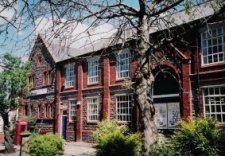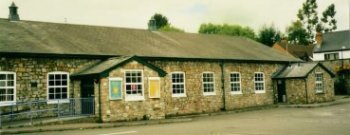Monmouthshire
 Abergavenny
Abergavenny
South Wales’ society underwent considerable
changes in the late nineteenth and early twentieth century. The heavily
populated industrial communities included in the list of Monmouthshire towns
reflected the movement towards workers’ self-education, militant consciousness
and working class political constituencies which, along with neighbouring
Glamorgan, went on to produce some of the key names in socialism.
It is likely that a young man enlisting in his local Territorial unit within this region would be familiar with some of the most prominent newspapers and pamphlets in Wales and that his father, or grandfather, would have encountered the co-operative societies, seen their friends enter the army, navy or even boxing as a way of making a respectable living, and observed the pressures towards unionism which resulted from a wave of catastrophic pit disasters and a deliberate reduction in miners’ wages. His father might well have rejoiced or grumbled as the Welsh Sunday Closing Act was passed in 1881, but the influence of the chapels set a pattern of Dissent which would have been a deep and lasting part of the young Territorial’s culture and awareness. Probably, he would have benefited from the increasing provision of schools in Wales and he might well have believed himself to be part of a generation for whom a bright future shone.

It is likely that a young man enlisting in his local Territorial unit within this region would be familiar with some of the most prominent newspapers and pamphlets in Wales and that his father, or grandfather, would have encountered the co-operative societies, seen their friends enter the army, navy or even boxing as a way of making a respectable living, and observed the pressures towards unionism which resulted from a wave of catastrophic pit disasters and a deliberate reduction in miners’ wages. His father might well have rejoiced or grumbled as the Welsh Sunday Closing Act was passed in 1881, but the influence of the chapels set a pattern of Dissent which would have been a deep and lasting part of the young Territorial’s culture and awareness. Probably, he would have benefited from the increasing provision of schools in Wales and he might well have believed himself to be part of a generation for whom a bright future shone.

Chepstow
 Abergavenny
Abergavenny
- Aberbargoed
- Abercarn
- Abergavenny
- Abertillery
- Betws ds
- Blackwood
- Blaen-avon
- Blaina
- Brynmawr
- Caerleon ds
- Chepstow
- Coleford
- Crumlin
- Cwm-bram
- Ebbw Vale
- Gardiffaith ds
- Goytrey ds
- Griffithstown
- Itton Court ds
- Llanhilleth
- Monmouth
- New Tredegar ds
- Newport
- Panteg
- Pontypool
- Rhymney
- Risca
- Rogerstone ds
- Sirhowy
- Sudbrook ds
- Tredegar
- Usk ds
- Ynysddu ds
© All material is copyright - refer to the
Terms of Use
Introduction
About
Anatomy
Drill
 Database
Database
 Memorabilia
Memorabilia
Resources Glossary
Saving Halls Participate Contact What's New? Terms of Use
Drill
 Database
Database Memorabilia
MemorabiliaResources Glossary
Saving Halls Participate Contact What's New? Terms of Use
The Drill Hall Project - Charting a neglected legacy